|
Women's Marching Feet Echo around the World
GENEVA, SWITZERLAND
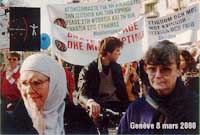
Above: Women demonstrate in Geneva. |
The launch of the World March of Women in Europe on March 8, 2000 was the occasion of a huge rally in the streets of Geneva, Switzerland. Women from all over Europe, both East and West, answered the call. After that, actions were staged in Albania, Cyprus, Denmark, France, the Netherlands, Portugal, Romania, Sweden, Turkey, and other countries.
|
Some 35,000 women gathered for a demonstration on October 14, 2000, in the European capital, two days before the world marches in Washington and New York. A delegation met with a European commissioner. Although that Sunday the streets around the European Commission were deserted, the demonstration had an effect on participating women's groups.
| BRUXELLES, BELGIAN
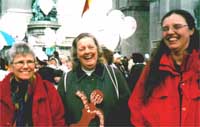
Above: Belgian demonstrators at the European March. |
SPAIN
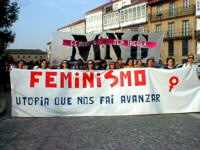
Above: "Feminism, a utopia that carries us forward" (Galicia). |
Spanish women all over the country were very active in the year 2000 and kept the mobilization going in 2001. After the September 11 attacks in the United States, they marched against war in Barcelona and in Galicia. "War and terror are always patriarchal tools that must be rejected by the feminist viewpoint," the women of Valencia affirmed and then staged a one-day hunger strike on December 1 to protest against discrimination between the sexes.
|
On October 17, from the United Nations, the Yugoslavian delegate on the March saluted "all those women of Serbia and Vojvodina who courageously conducted an electoral campaign based on women's rights in Yugoslavia" and those women who, "with undefeatable hope and commitment, fight repression and poverty." She protested against the impunity enjoyed by dictators and called for a legal system that implements the offending party's obligation to repair damages.
| YUGOSLAVIA
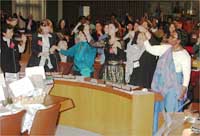
Above: The group of women living in conflict areas, at the UN. |
ITALY
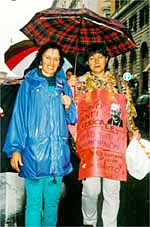
Above: The demonstration in Rome on September 30, 2000. |
Italian women were active in the struggle against the war in the former Yugoslavia and in Afghanistan, and against militarization fostered by neoliberal globalization. They insisted that these issues be included in the European common platform, which rejected all forms of extremism, fundamentalism and all measures imposed on women in the name of custom, tradition or religion.
|
|









